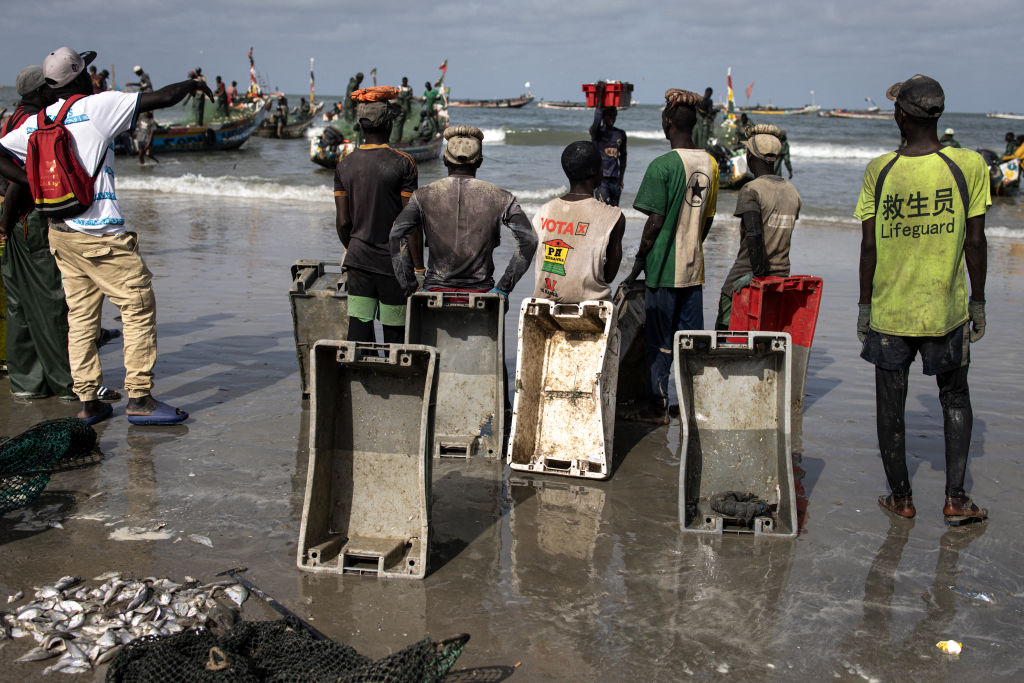ADF STAFF
Souleymane Faye, a retired Senegalese fisherman, watched with dismay as a group of sea-weary artisanal fishermen hauled their colorful canoes ashore in Bargny, about 15 kilometers east of Dakar.
“Look, they’ve just arrived,” Faye told Reuters in March. Looking inside boxes used to carry their catch, he said, “There’s nothing.”
Locals have long blamed foreign industrial trawlers, mostly Chinese, for decimating the nation’s fish stocks through illegal, unreported and unregulated (IUU) fishing practices. According to the Environmental Justice Foundation (EJF), Senegal loses more than $270 million in revenue each year to illegal fishing.
“The abundance that once existed is diminishing,” Malick Seck, a fisherman in Fasse Boye, told the EJF. “At this rate, we cannot survive.”
After years of criticism over weak governance of its fisheries sector, Senegal’s government — under new President Bassirou Diomaye Faye — in May initiated a number of measures to curb IUU fishing, starting with the publication of a list of vessels authorized to fish in the nation’s waters.
The list includes 132 national trawlers and 19 foreign trawlers. The registry, which aims to enhance transparency over the management of natural resources, includes the names of the vessels, their owners, their capacity, the type of fishing they are allowed to perform and the size of net they can use, according to The Maritime Executive.
The move “reflects the principle of transparency in the management of natural resources, which are a national heritage,” Fatou Diouf, minister of Fisheries, Maritime Infrastructure and Ports, said in a report by the African Confederation of Professional Organizations of Artisanal Fisheries (CAOPA).
Besides publishing the list of approved fishing vessels, the Senegalese Council of Ministers, chaired by Faye, has called for strengthening the country’s Maritime Fishing Code. Faye also has called for an inventory and evaluation of state intervention, subsidies and funding in the fisheries sector, according to The Maritime Executive.
Aliou Ba, an ocean campaign manager for Greenpeace, applauded the moves.
“So, now what we are urging the state to do is audit this list and look into the Senegalese flag issue so that we can understand how these ships were able to have fishing licenses and how they were able to pose as Senegalese ships and be active in Senegalese areas,” Ba told France 24.
Chinese trawlers are notorious for “flagging in” to African nations, meaning they use and abuse local rules to flag a foreign-owned and -operated fishing vessel into an African registry to fish in local waters. Flagging in is a common sign that vessels engage in illegal fishing.
China is the world’s worst IUU fishing offender, according to the IUU Fishing Index. Of the top 10 companies engaged in illegal fishing globally, eight are from China.
Overfishing by China and other nations has been catastrophic in Senegal and around West Africa. About 20% of illegally caught fish worldwide comes from waters near The Gambia, Guinea, Guinea-Bissau, Mauritania, Senegal and Sierra Leone, according to a report by news organization Investigative Journalism Reportika.
Due to illegal fishing, artisanal fishermen in Senegal said that their catches fell by 58% between 2012 and 2019, according to a 2023 EJF report. Some 78% of fishermen and fish processors interviewed by the EJF said it was increasingly harder to feed their families.
“In every fisherman’s tent you go to, the subject of discussion is the scarcity of fish,” Arona Boye, a Fasse Boye fisherman, told the EJF. “The ships catch everything that we are supposed to catch. You go fishing, set your nets and catch nothing.”
Besides flagging in, using prohibited nets, fishing with explosives and fishing in prohibited areas, Chinese trawlers in Senegal also commonly practice bottom trawling, which indiscriminately scoops up all manner of marine life.
“Bottom trawling is an activity that we, as managers of the seabed, want to change,” Selle Mbengue, director of management and exploitation of the deep sea for Senegal’s fishing ministry, told the EJF. “Not only does it destroy habitats, it also harms the seabed ecosystem and we need a seabed ecosystem with its habitats and all its natural wealth.”
In 2023, almost 100 fishing vessels practiced bottom trawling in Senegal, the foundation reported.

